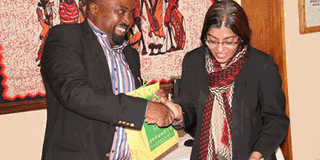Rivatex gets Sh3bn India loan for purchase of new machines

Uasin Gishu County Deputy Governor Daniel Chemno presents a gift to Indian High Commissioner to Kenya Suchitra Durai on Saturday March 12, 2016. India has given a Sh3 billion loan to the RiftValley Textile (Rivatex) East African Limited to upgrade its operations. PHOTO | DENNIS LUBANGA
What you need to know:
- "It is clear that the good relations and partnerships between these two great nations have seen rapid transformations in various fields especially in trade where we are now talking of 4.3 billion dollar annually," said Durai on Saturday at the factory in Eldoret.
- Ms Edah Kinyua, a tailor, said that the factory had received orders for various garments including uniforms, shirts, trousers, and pullovers – a major improvement from the past.
The Rift Valley Textile (Rivatex) East Africa has received a Sh3 billion loan from the Indian government through the Exim Bank to purchase new machines.
The Indian High Commissioner to Kenya Suchitra Durai said that India will continue offering technological support to the factory.
Ms Durai noted that Kenya and India enjoy excellent relations which has existed for a long time since colonial times.
"It is clear that the good relations and partnerships between these two great nations have seen rapid transformations in various fields especially in trade where we are now talking of 4.3 billion dollar annually," said Durai on Saturday at the factory in Eldoret.
Rivatex is owned by Moi University. The university acquired the collapsed factory in 2007 at a cost of Sh205 million.
CREATE JOBS
Uasin Gishu County Deputy Governor Daniel Chemno who accompanied the ambassador said the support from India will see the factory increase its production and compete with other textile companies globally.
"Once Rivatex gets the new machines, it will be able to exploit the market due to its efficiency but will also create job opportunities to over 3,000 residents," said Mr Chemno.
Employees at the facility said the new machines will ease their workload.
Ms Edah Kinyua, a tailor, said that the factory had received orders for various garments including uniforms, shirts, trousers, and pullovers – a major improvement from the past.
“The new machines are really going to increase our orders and all we can say is that we are happy and excited,” said Ms Kinyua.
Rivatex currently employs about 600 people. The machines at the factory were acquired more than 40 years ago and have been experiencing frequent breakdowns.
Products from Rivatex are sold locally and in the region. Moi University Vice Chancellor Prof Richard Mibey said the challenge was on farmers to scale up cotton growing.




